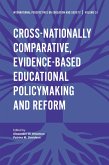This book in the International Perspectives on Education and Society (IPES) series describes, synthesizes, and forecasts how large-scale assessments and quantitative data impact evidence-based policymaking worldwide. This volume pays particular attention to the Middle East and North African (MENA) region and surrounding countries. The chapters provide and explain policymaking examples from national educational systems and international organizations in the United Arab Emirates, South Africa, Russia, Brazil and China, providing a forum for scholars and policymakers to identify how large-scale assessments and quantitative data can be used to inform policymaking at all levels of education, and how these data can be used to better understand specific country- and regional-level educational challenges. Emphasizing that quantitative research evidence is often the most legitimized among national educational policymakers and international organizations influencing national educational policymaking due to its perceived accuracy and trustworthiness, authors discuss how this data is not always used to its full potential by policymakers or educators because of the predominant focus on student achievement and rankings systems. While student achievement data can offer great insight on educational systems, the unique country-level background data available through large international datasets provides opportunity for scholars and policymakers to develop greater insight into the social and cultural factors that influence education systems around the world.
Dieser Download kann aus rechtlichen Gründen nur mit Rechnungsadresse in A, B, BG, CY, CZ, D, DK, EW, E, FIN, F, GR, HR, H, IRL, I, LT, L, LR, M, NL, PL, P, R, S, SLO, SK ausgeliefert werden.









